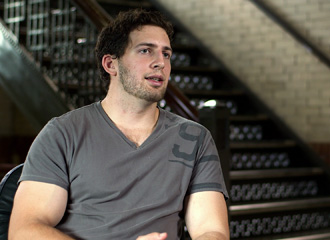Back to School: Pursuing College After the Military
3-minute read
Back to School: Pursuing College After the Military
3-minute read
Many Veterans choose to go back to school after the military — earning a bachelor’s degree, master’s degree, or Ph.D., or getting advanced technical training or certification. But for some, it may be difficult to know where to start. Here are a few tips from Veterans like you on how to approach training or college after the military, along with some recommendations for finding a community at school or on campus.
Finding a Veteran Community in Higher Education
Veterans face a unique challenge when it comes to relating to their civilian classmates who may not understand what they went through in the service. During your transition into a higher education environment, you can find a community of support, whether through student Veteran organizations or counseling resources offered at your school.
“I ran into another guy who was about the same age, and we just looked at each other and I was like, ‘Army? Marines?’” He was like, ‘I was in the Marines,’” says Ian, a U.S. Army Veteran who returned to school after service. “We were instantly good friends, and so I started building that support network up. We were leaving class one day and he was like, ‘By the way, you should probably check out student services. They have counseling — I go to them from time to time.”
Watch the video at right to learn how student Veterans have found a community of support in higher education.
Education Benefits for Veterans
One of your first thoughts about going back to school might be: “How will I afford it?”
To help pursue higher education, Veterans can access several benefits, including scholarships and college loan forgiveness programs. Here are some FAQs on scholarships and college grants for Veterans:
Can I get VA education benefits through the Post-9/11 GI Bill?
You may be able to get benefits through the Post-9/11 GI Bill if you’ve served on active duty for at least 90 days after Sept. 10, 2001, whether your service was continuous (all at once) or interrupted (for shorter periods over time).
Can I get VA education benefits through the Montgomery GI Bill?
VA has two Montgomery GI Bill programs: Montgomery GI Bill Active Duty or Montgomery GI Bill Selected Reserve.
Montgomery GI Bill Active Duty (MGIB-AD): You may be able to get benefits through MGIB-AD if you served at least two years on active duty, and you:
- Were honorably discharged, and
- Have a high school diploma, GED, or 12 hours of college credit.
Montgomery GI Bill Selected Reserve (MGIB-SR): You can get benefits through MGIB-SR if you’re a member of the Army, Navy, Air Force, Marine Corps, or Coast Guard Reserve; Army National Guard; or Air National Guard, and you:
- Have a six-year service obligation (you agreed to serve six years) in the Selected Service, or
- Are an officer in the Selected Reserve who agreed to serve six years in addition to your initial service obligation.
Can I get VA education benefits through other programs?
You may be able to get help paying for school tuition, testing fees, and advanced licensing and certifications through other VA educational assistance programs. You may also be able to get entrepreneurship training to help start or improve a small business. Find out more about advanced training and certifications and educational assistance programs.


